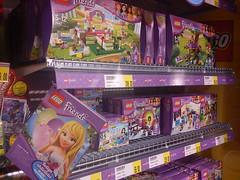[This post was originally published at the Parentonomics blog at Forbes.com on 30th March 2012].
That is precisely what you will get if you try out this great new site: GenderRemixer.com. What the site allows you to do is take the audio from one toy advertisement (say, Battleship) and place it
That is precisely what you will get if you try out this great new site: GenderRemixer.com. What the site allows you to do is take the audio from one toy advertisement (say, Battleship) and place it
with the video of another toy advertisement (say, My Little Pony). While the result is to tell us what we already know -- toy manufacturers treat boys and girls differently -- it does so in a beautifully stark manner. That makes it worth your attention if only to see how similar the structure and narrative of these ads are despite their markedly different tone and orientation.
Actually, GenderRemixer specifically target Lego that has been in the news lately releasing Lego sets designed specifically for girls. If you try this tool outyou can play around with those advertisements too. Lego recently released 'Lego Friends' that were designed to be played with as well as built. This all came from Lego's own research that suggested a gender difference in how kids play with Lego (boys build and girls play they found). And, of course, given that no such research that is devised to determine differences in average behavior can possibly suit all comers, that generated controversy. In my household, with two girls and one boy, 'Lego Friends' were completely unappealing. Why? My eldest daughter (13) is only interested in building stuff from sets. My son (11) wants to build set to understand how he can change them. While my youngest daughter (7) loves the Star Wars sets so she can reenact the scenes from the movies. Now, of course, that last bit is consistent with Lego's research about play versus building. But she wanted to play with the sets related to the movie she loves and not some alternative Lego structured scenario.
Marketing is a tricky business but, as a parent, I'm sensitive to the messages marketing sends. Despite years of progress so reasons that have long kept me troubled, the market still finds it worthwhile to target genders differently. They do this for adults as well as for children. But it is the children we worry about because we worry about reinforcement of stereotypes. In my case, we have ruthlessly used the hard hand of parental preference to stamp these things out. While for our eldest, we achieved our goal (perhaps too far), for our youngest, we got Star Wars but we also could not rid ourselves of American Girl Place. Call it all just part of the ongoing battle of wills.
